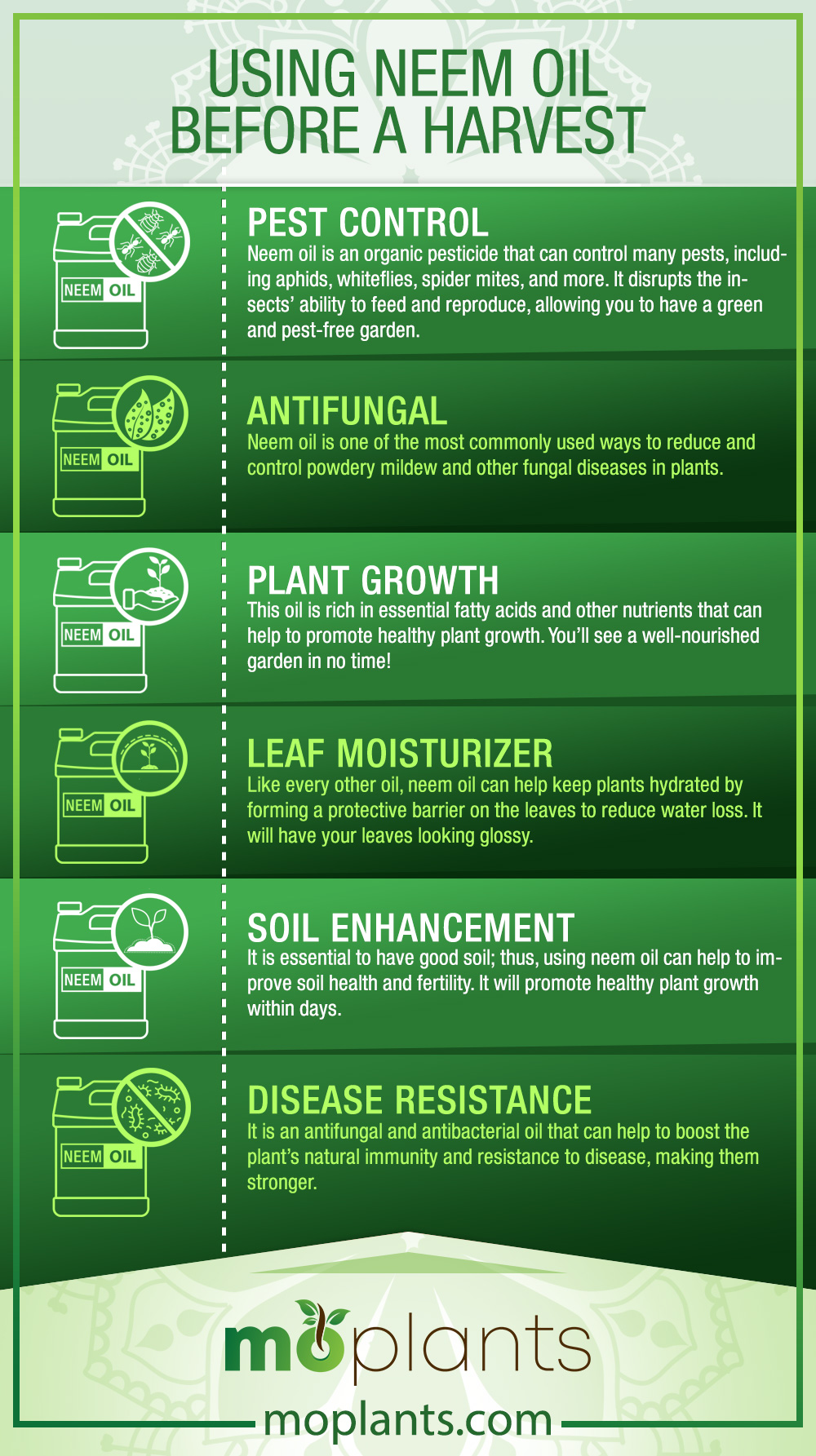You might have seen great results from using neem oil for pest control in your indoor and outdoor garden. If you did, you might have also wondered if you can spray it on your fruits and vegetables before a harvest. Let’s give you the answer straight away: yes, you can use neem oil on fruits and vegetables.
Neem oil is safe to apply via spray before your harvest. If you’re set to harvest in less than seven days of spraying neem oil, you just need to be extra careful with washing your fresh produce. Since the oil has chemicals, it can be extremely harmful when indigested.
Here’s all you need to know about using neem oil before a harvest.
Using Neem Oil Before a Harvest
Neem oil is highly favorable for a variety of plants. Its benefits include the following:
Pest Control: Neem oil is an organic pesticide that can control many pests, including aphids, whiteflies, spider mites, and more. It disrupts the insects’ ability to feed and reproduce, allowing you to have a green and pest-free garden.
Antifungal: Neem oil is one of the most commonly used ways to reduce and control powdery mildew and other fungal diseases in plants.
Plant Growth: This oil is rich in essential fatty acids and other nutrients that can help to promote healthy plant growth. You’ll see a well-nourished garden in no time!
Leaf Moisturizer: Like every other oil, neem oil can help keep plants hydrated by forming a protective barrier on the leaves to reduce water loss. It will have your leaves looking glossy.
Soil Enhancement: It is essential to have good soil; thus, using neem oil can help to improve soil health and fertility. It will promote healthy plant growth within days.
Disease Resistance: It is an antifungal and antibacterial oil that can help to boost the plant’s natural immunity and resistance to disease, making them stronger.

Neem Oil as a Pesticide
While neem oil has a range of benefits, the most common use of this oil is as a pesticide. Since it is extracted from the seeds of the neem tree, it is one of the most effective ways to eradicate pests from your garden. Its insecticidal properties can help to control a wide range of pests, including aphids, whiteflies, and spider mites, and it is mostly used as a fungicide and pesticide.
To use neem oil before a harvest as a pest control method, follow these steps:
- Mix the neem oil with water at a ratio of 2-3 tablespoons of neem oil per gallon of water.
- Add a few drops of dish soap or a surfactant to the mixture to help the neem oil adhere to the plant leaves.
- Use a spray bottle or a pump sprayer to apply the mixture to the plants, making sure to cover the tops and bottoms of the leaves.
- Apply the neem oil solution in the early morning or late evening when the temperature is cooler to avoid leaf burn.
- Repeat the application (spraying method) every 7-10 days or as needed.
- Follow the label instructions and safety precautions when using neem oil.
- Avoid applying neem oil during the flowering stage of plants as it can be toxic to beneficial insects such as bees and butterflies and if you plan to use the plants for food or medicinal purposes.
- Neem oil should not be applied to plants when the temperature is above 90°F or when the plants are under heat stress, as this can cause leaf burn.
- Always test a small area of the plant before treating the entire crop to ensure the plant can tolerate the neem oil solution.
- It’s also important to note that neem oil can also be toxic to beneficial insects such as bees and butterflies, so avoid applying it during the flowering period.
- Don’t apply neem oil to plants already stressed from environmental conditions such as drought or extreme heat.
- Don’t use neem oil as the only pest management method; use it as a part of an integrated pest management strategy.
Following these guidelines, you can effectively use neem oil before a harvest to control pests and diseases while protecting your plants and the environment.
Final Thoughts
In conclusion, neem oil before a harvest can be an effective natural pest control method for many pests and fungal diseases. It also has other plant benefits, such as promoting healthy growth, moisturizing leaves, and improving soil health. However, it’s important to use neem oil with caution and follow the proper guidelines to ensure the safety and effectiveness of the treatment.
It includes mixing it with water and a surfactant, applying it in the early morning or late evening, avoiding application during the flowering stage, and not applying it when the temperature is above 90°F or when the plants are under heat stress. Following these guidelines, you can use neem oil effectively before a harvest to control pests and diseases while protecting your plants and the environment.

